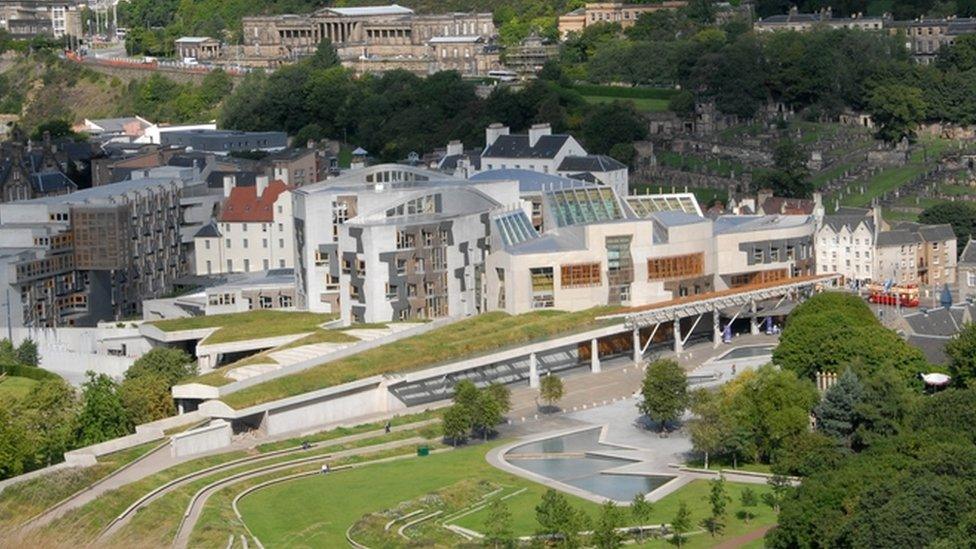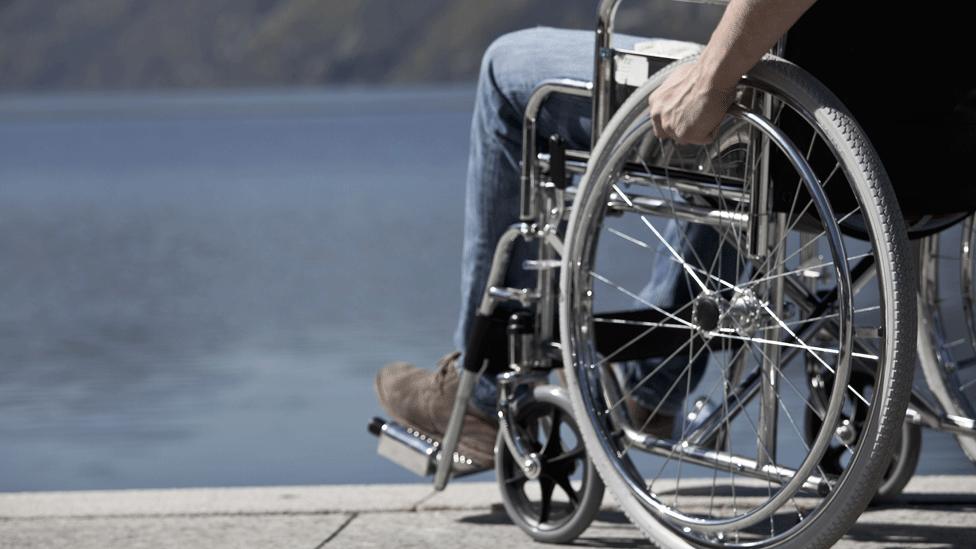Timetable for transfer of welfare powers to Holyrood
- Published

MSPs will be able to create new benefits in devolved areas after the transfer of welfare powers
MSPs will take some responsibility for welfare for the first time when Holyrood returns from its summer break.
The UK government said it would lay regulations in parliament on Thursday which will devolve some of the powers to MSPs from 5 September.
It means when the parliament sits again after recess, MSPs will be able to create new benefits in devolved areas.
They will also be able to top-up existing payments such as Universal Credit, tax credits and Child Benefit.
The new powers mean Scotland can make changes to the timings of payments for Universal Credit and alter employment support as well.
The move was agreed in the Scotland Act 2016, external which was passed in March.
SNP ministers are currently scheduled to bring forward a Social Security Bill, which will establish a new welfare agency for Scotland, during the 2016-17 parliamentary session.

What do the proposed changes to welfare powers actually mean?
Analysis by BBC Scotland's home affairs correspondent Reevel Alderson
At the moment the Scottish government has limited powers over welfare. They are:
the Scottish Welfare Fund, which includes crisis and community care payments. These allow ministers to make small payments to alleviate short-term needs - or to provide goods such as washing machines and cookers to people who need to establish themselves in a home because, for example, they are fleeing domestic abuse or leaving prison.
council tax reduction.
discretionary housing payments. These have been used to reduce the effects of the so-called "bedroom tax" although they were not specifically designed for this.
The new benefits for Holyrood will not be introduced immediately. When MSPs return to work they will begin the process of legislating for the new powers. So it will take a while before it all comes to fruition. Once there is legislation, they will be able to change:
benefits in devolved areas such as health and education. The Scottish government has already said it wants to introduce early years and maternity allowances.
topping up benefits. These could affect a range of benefits including Universal Credit, tax credits and Child Benefit. New powers mean Scotland could make changes to the timings of payments for Universal Credit and alter employment support as well. Poverty campaigners are calling for child benefit to be increased by £5 a week, which the Poverty Alliance said could reduce child poverty by 14%.
The Scottish government said the changes to its welfare powers will mean it will control more than 15% (£2.7bn) of social security spending. The rest remains at Westminster. Ministers maintain that means they cannot redress all of the unfairness within the current system, but it is a start.

Scottish Secretary David Mundell, said: "The transfer of a range of welfare powers is a key milestone in giving the Scottish parliament the ability, for the first time, to legislate on benefits and create a welfare system tailored to local needs.
"This includes the ability to create entirely new welfare benefits - a very significant new power - and I look forward to seeing how the Scottish government will use this."
He added: "Crucially, these powers are being transferred while maintaining for people in Scotland the benefits of being part of a United Kingdom. Scotland has two governments, each with different but complementary responsibilities, and it is vital that we continue to work closely together in the national interest."
Other new powers coming to Holyrood will mean that from 21 August, the Scottish government will be able to appoint a member of the board at the communications watchdog Ofcom.
MSPs will assume control over income tax rates and bands in Scotland from 1 April 2017, with Scottish ministers becoming responsible for Air Passenger Duty in April 2018.
'Secure transfer'
Keith Brown, the Scottish government's Secretary for Economy, Jobs and Fair Work, said the Scotland Act was the most "substantial change" to the powers of the parliament since devolution.
"While we are already working to use these powers as quickly as possible to improve people's lives in Scotland, we are well aware of the scale of this task and our top priority is the safe and secure transfer of these powers to ensure anyone in receipt of benefits receives the right payment at the right time," he said.
"We have already committed to extending winter fuel payments to families with severely disabled children and reform assessments for disability benefits.
"While the Scotland Act does not go as far as we would wish, we will always use all the powers available to us in the best interests of Scotland."

Charities have said the new powers could make a real difference to child poverty in Scotland
Bill Scott from Inclusion Scotland said the changes could make a big difference to the poorest people in Scotland.
He told BBC Scotland's Good Morning Scotland programme: "Child benefit top-up would be a real boost to families that have been really hard hit, and that includes families with disabled children.
"There is real destitution in Scotland now, with people going without the basic necessities - to eat, to keep a roof over their head, to clothe themselves and heat their homes. Without that, we're going to see families literally on the streets - third world-type poverty in Scotland."
- Published16 June 2016

- Published9 November 2015
